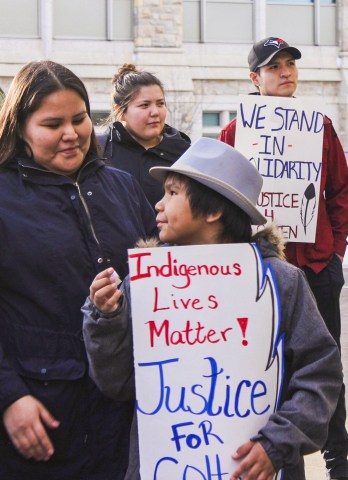In the wake of the not guilty verdict, students across campus who believe the verdict was an error of the justice system have organized various events to stand in solidarity with the Indigenous community after the killing of 22-year-old Colten Boushie of Red Pheasant First Nation.

Demonstrators held signs stating their solidarity with Colten Boushie’s family.
The most attended of these events at the University of Saskatchewan was the Justice For Colten Rally and March, which was held outside of the Gordon Oakes Red Bear Student Centre on Feb. 13. Approximately 300 students gathered to participate in the march, led by drummers and singers who walked down the University Bridge to the Court of Queen’s Bench on Spadina Crescent East.
The demonstration, held by the Indigenous Students’ Council and the Indigenous Graduate Students’ Council, was a way for students to stand in solidarity with the Boushie-Baptiste family and call on the government to take action. Iloradanon Efimoff, a second-year master’s student in applied social psychology and co-chair of the IGSC, discusses the importance of this rally for the campus community.
“The march and rally is an opportunity to come together to support the [Boushie-Baptiste] family and one another, so that people would see that this is an important issue and that our students are united on this front,” Efimoff said.
At trial, Stanley pleaded not guilty to second-degree murder charges. On Feb. 9, the jury granted Stanley a full acquittal. The outcome of the trial sparked varied emotions across the nation, as many believed that justice had not been brought to the Boushie-Baptiste family. At the U of S, there have been vocal supporters on both sides of the issue.
Some students have taken to online forums, including the anonymous Facebook page USask Confessions, while others have channelled their emotions into resolve for change by launching events to cope with the outcome of the trial or to rally for change in the Canadian justice system.
On Feb. 16, the History Graduate Student Committee hosted a letter writing campaign for students, faculty and staff to write letters lobbying the provincial and federal attorney generals to file an appeal in the Stanley case. In total, 52 letters were sent. Tyla Betke, a first-year master’s student in the department of history and the communications officer of the HGSC, notes the success of the campaign.
“Staff and students came together from across several disciplines to show their support on short notice, allowing us to send 52 letters or emails to our provincial and federal governments about the case, and the justice system more broadly,” Betke said. “We were happy to do our small part.”
Additionally, both the College of Education and the Peer Health centre have provided safe spaces for students to discuss their emotions in the wake of this trial.
Community Legal Assistance Services for Saskatoon Inner City, a group of U of S law students who provide free legal help for all members of the community facing systemic barriers, issued a statement on Feb. 22 outlining their commitment to provide legal support for those seeking justice and to work towards reconciliation.
“We believe that education, information, and open discussions will support reconciliation — in other words, a society walking towards the future together,” the CLASSIC Facebook post read.
Regan Ratt-Misponas, a third-year Indigenous studies student and the president of the ISC, explains that Boushie’s death is a reminder of the injustices that Indigenous people face in the legal system and how students must remain united as a community to seek change.
“I think that’s how we need to continue to move forward, showing each other that we are there for each other and that we’re not going to back down. This is something that needs to continue — not only continuing the conversation, but also ensuring that justice is served,” Ratt-Misponas said. “It is within our hands. We’re not only student leaders here on campus; we are leaders within the outside community as well.”
—
Rebecca Tweidt
Photo: Victoria Becker / Outreach Director
Leave a Reply